The Costco Vendor Guide for Beginners
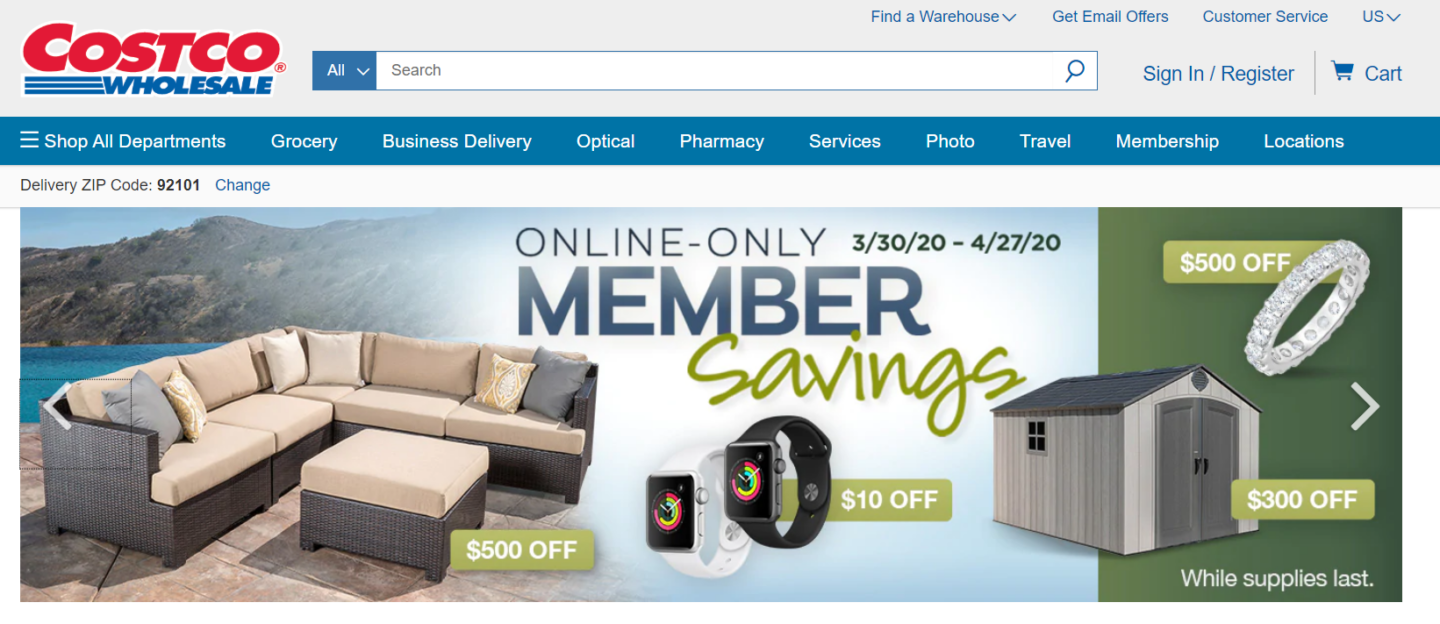
Costco is one of the few brick and mortars that continues to thrive in a post-Amazon retail world, with sales surging by over $1.5 billion in March alone as Costco members stocked up due to coronavirus.
Costco’s customers are incredibly loyal and accustomed to a higher up-front price for bulk-sized or huge quantities of items.
For consumers, Costco has become synonymous with quality and bulk value, with warehouses stocked with premium brands and private labeled products at below-market price-per-unit prices.
Let’s take a look at everything you need to know about becoming a Costco vendor, whether you’re an established brand manufacturer or a private label.
Costco Wholesale Corporation got its start in Seattle, Washington, in 1983–11 years before Amazon, and 21 years after Walmart. In 1993, Costco merged with a company that was built on a warehouse model, then went through several name changes before settling on Costco Companies. Inc.
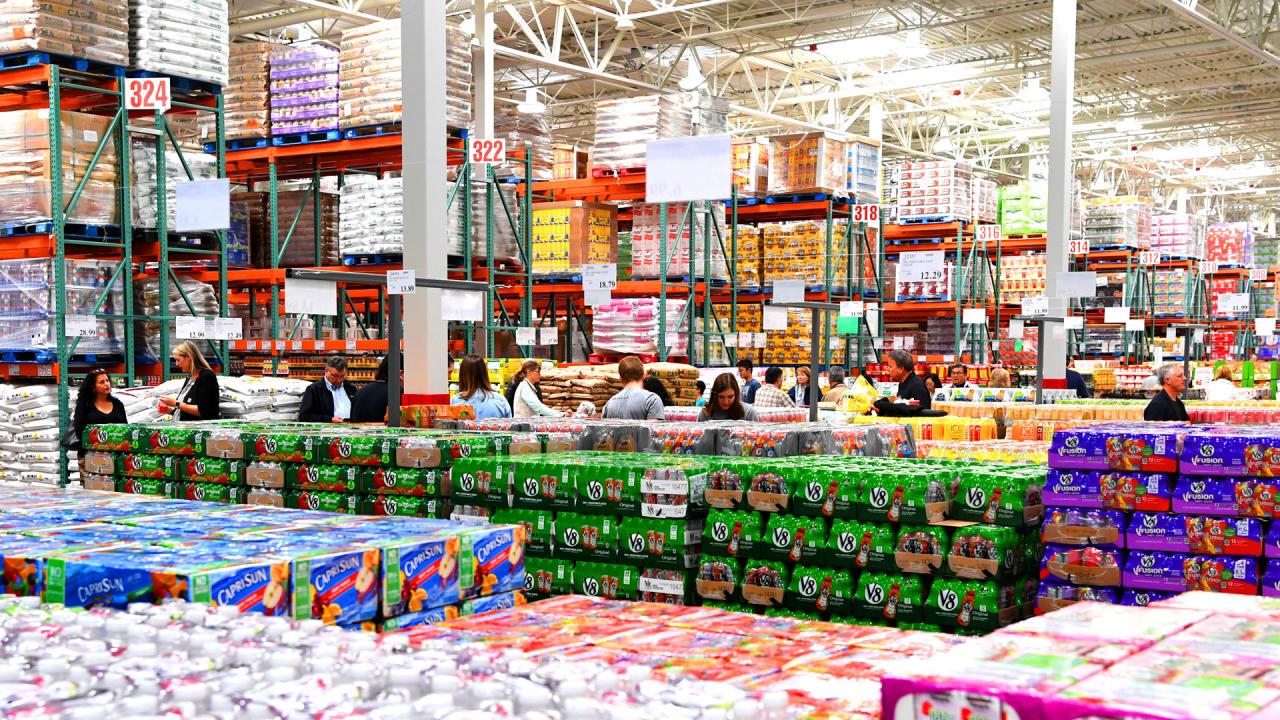
There are two channels where customers can access Costco:
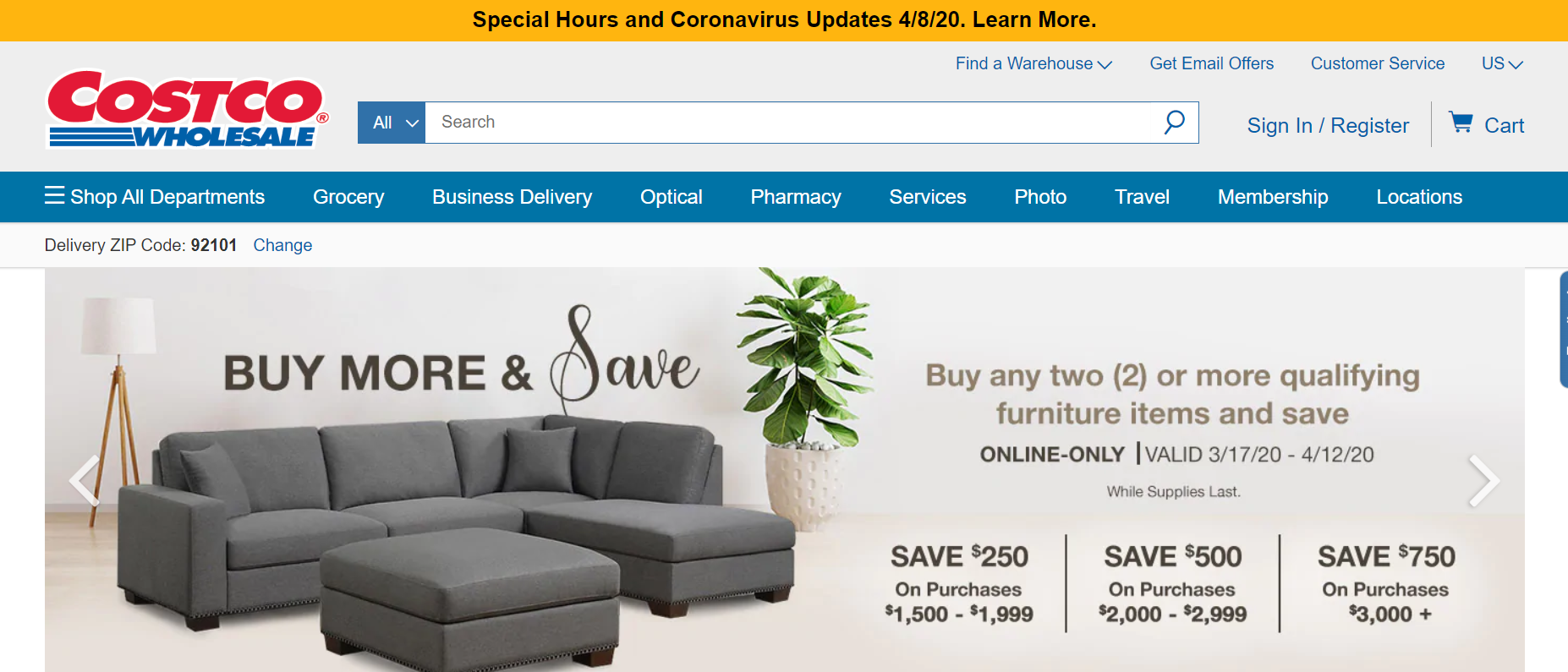
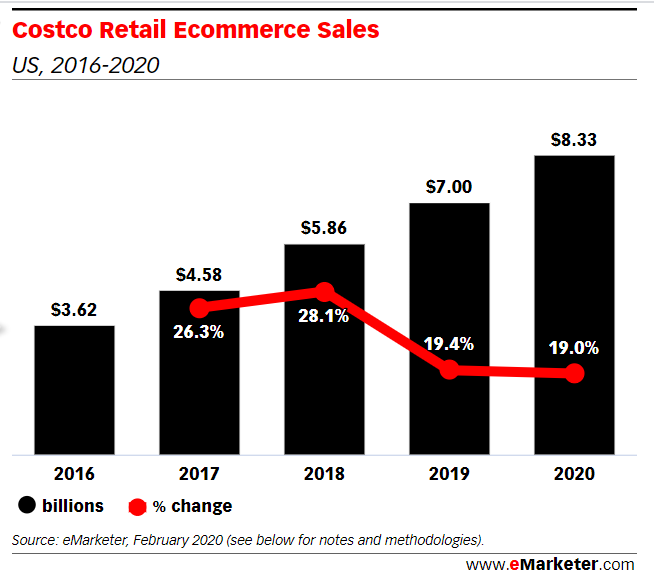
Costco’s not just limited to big bags of toilet paper and massive quantities of chicken thighs. In addition to their in-store selection of freshly made deli foods and even gas stations, here are their product categories online:
Note: Not all of these product categories are offered in-store. For more information on the products that perform well online vs. offline, see the “Costco.com vs. Brick and Mortar” section below.
Costco has a reputation for offering value and quality. Unfortunately for some brands, Costco is not always synonymous with luxury.
For brands that rely on an “exclusive” reputation, this could be a problem–particularly amongst distributors.
David De Nino, the Director of Ecommerce for a luxury haircare brand, felt the negative impact once his company started selling products on Costco.com.
“The biggest drawback of working with Costco is that every other [distributor] we have hates it. Anyone can do a simple search and see that it makes way more sense to buy our shampoo in a bigger bottle on Costco.com than at a salon. In fact, we can’t even sell to our own customers on our site at the price Costco sells to them. There’s also a status associated with it–we’re a premium luxury product, and some salons don’t like to hear that we’re selling there. We’ve had accounts drop us for being on Costco.”
De Nino has found it difficult to maintain the brand’s status of “premium” while selling on the site. However, he also knows his company can’t afford to drop it. “We’re still a small business,” he states, “and we could never stop selling on Costco.”
One of the many benefits of becoming a Costco vendor is leveraging their built-in customer base. Costco’s customers tend to be rabid fans–particularly members who frequent brick-and-mortar locations.
Here are a few key points about Costco’s customers from their 2019 financial report:
While there are several key differences between the typical in-store vs. online shopper, Costco customers are loyal to the Costco brand–not necessarily product brands.
For new brands starting out, that’s a good thing. De Nino explains:
“Costco members and non-members alike trust what Costco sells. We see a lot of reviews on our products that say things like ‘I’ve never heard of this product or brand, but I figured if Costco was selling it, that it was worth trying’. They look at it like Costco’s vouching for the product, and they feel like Costco curates what they sell, whether or not it’s true.’
Costco customers expect value, not necessarily “cheap” prices, meaning they are willing to pay higher prices for both quality and quantity.
Unlike Amazon, all brand manufacturers are Costco vendors.
There is no third-party marketplace where you can sell your products, manage your ads, or tweak your listings.
As a Costco vendor, you have two options:
According to the same 2019 financial report, Costco’s net sales for their online business were about 4% of their overall net sales.
Though that number may seem insignificant, keep in mind that there are products available on Costco.com that are available to non-members, offering Costco broader market reach.
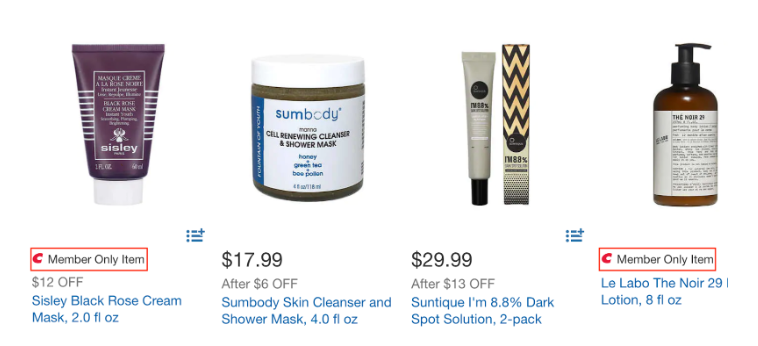
“The online consumer is quite a bit younger and less affluent than the brick and mortar customer,” says De Nino. “Partly, it’s the younger people can’t afford the price threshold or people in urban environments who may not invest in bulk products [due to a lack of space.]”
Your ability to get onto the shelves of a Costco warehouse really boils down to two things: shelf space and category.
De Nino explains:
“Digital shelf space is infinite – it doesn’t cost [Costco] much more than a few additional server bytes. Whereas with their bricks-and-mortar, you have to compete in a much more narrow environment and prove that your product will be worth it to them.”
Between becoming a Costco vendor online or offline, there’s no superior place to sell your products. Either one could be profitable depending on your product.
For example, De Nino’s company is wildly succeeding online – but their high price point and specific category make it virtually impossible to get into Costco’s brick and mortars.
Part of this is because the health and beauty category isn’t a big mover in their stores. Costco shoppers are typically focused on filling up their carts with bulk packages of meat and paper goods–health and beauty products are afterthoughts or impulse buys.
If you’re selling a $60 shampoo like De Nino, you don’t have a great chance of snagging those impulse-buy shoppers before checkout.
Generally, you’ll see name-brands on Costco’s shelves, while you’ll see smaller brands online. Unless you can prove your product has a rabid fan base or that you can provide better value than other brands or products, your best bet is to sell on Costco.com.
Understanding Costco’s decision-makers’ thought-processes behind which products are sold online and brick-and-mortar stores is imperative.
Look over findings from Costco’s 2019 fiscal report to help you understand how Costco approaches their potential vendors:
Whether you’re a brand or private labeler, Costco needs to see your value proposition.
This is particularly true if you’re attempting to woo an in-store buyer.
And there are two things you should keep in mind before pitching a product to sell online or in-store:
1. You’ll need to provide at least a 15% discount compared to other retailers
2. Or you’ll need to uniquely package your products in bulk.
Though this could upset your other distributors, you must understand that if your product is being sold at the same rate as you’re selling it on Target and it’s not bulk packaged, Costco may not consider your products.
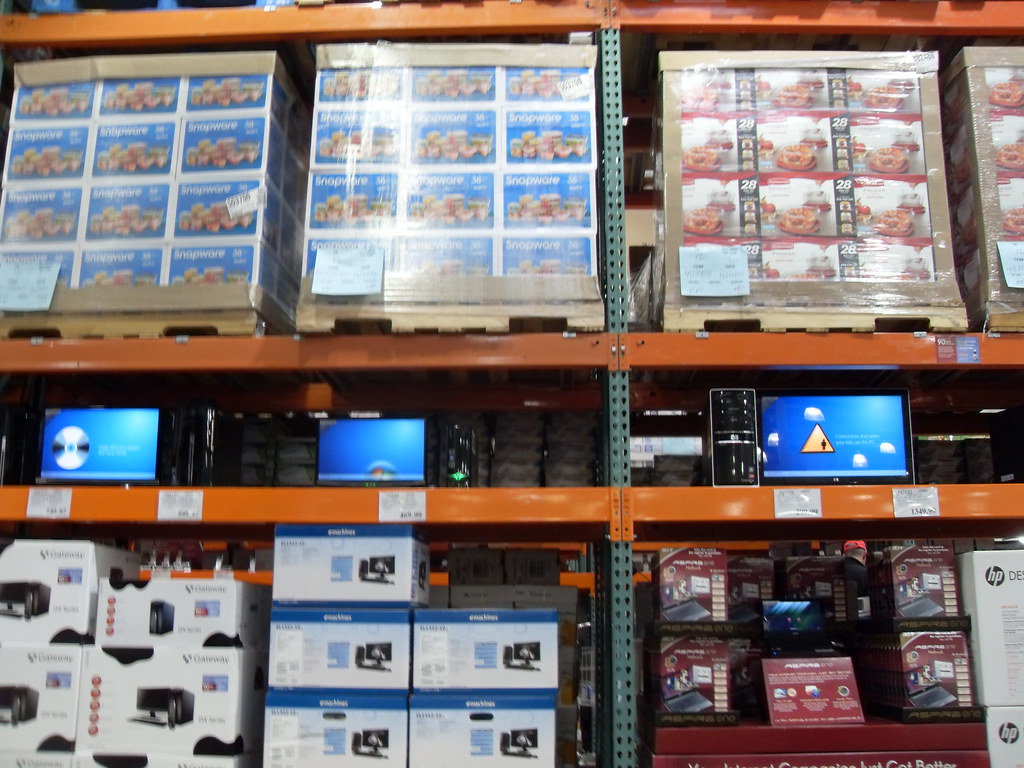
It’s evident then that selling online is often easier than selling in-store. De Nino and his team sent examples of their product, gave the Costco team an in-person pitch, and talked about their unique value proposition and discounts, and they were accepted. But that’s only half the battle:
“It might be easy to get your product on Costco.com,” says De Nino, “But it’s not easy to keep it on there. The threshold for SKUs is $1500 per week in gross sales. Can you stay on the site under that price point? Sometimes. But generally, that’s the point where Costco wants you to stay.”
If you’d like to start the process and make a vendor inquiry, you can do that on Costco’s site. Keep reading to learn more about how to become a Costco vendor.
Despite there being many case-studies of successful Costco vendors, the information about getting started as a Costco vendor is limited.
To help you understand the process, we’ve compiled as much information as we could find on their website to jumpstart your Costco vendor offerings.
Before you become a Costco vendor, however, you must prepare your organization and products for distribution at scale.
On their website, Costco provides few resources for potential vendors. In fact, there are only two actions a potential vendor could take! If you are selling non-food or sundry items, you can contact the corporate office. If you are a prospective vendor of food and sundry items, you can contact the appropriate division office. See their vendor contact page here, and read more about what you can expect below.
1. After contacting the regional office (and if they are interested in your product), the division office may request a short description of the items you wish to sell and of your company. As with any pitch, you should prepare to be asked questions about your products’ marketability and any other finance-related questions.
2. After speaking with the regional manager, your Costco vendor application is forwarded to the Category Buyer, the person who determines the applicability of your product.
3. If your Costco vendor application is approved by the Category Buyer, Costco will send a team of auditors to your production facilities to inspect your work standards. If no issues are found during the audit, you will be able to start selling.
4. If you are only selling online, make sure you have a website for your products and can integrate your current online store with Costco.com.
On top of Costco’s vendor program, Costco is committed to providing opportunities for qualified local minority-owned and women-owned suppliers in the communities where they do business, whenever possible.
If you are reading this article and fall into either category, applying for their Supplier Diversity Program is a sure-fire way to make your company standout amongst a huge pool of applicants. Read more information here. Take note, however, that completing the application does not guarantee a business partnership with Costco Wholesale.
Costco Roadshows allow both brands and Costco to try out the vendor model in an isolated setting.
Usually marketed as an interactive experience or pop-up fair, the Costco Roadshow takes place in selected warehouses during specific time periods. Every company that attends a Costco Roadshow is responsible for staffing their booth, as well as delivering and stocking inventory.
Roadshow products are on consignment and the supplier is paid for what is sold. If the products’ performance wows the Regional Managers, your chances of becoming a Costco Vendor skyrocket. See special events, including Roadshows, in your region here.
No matter your product or Costco vendor approach, there is an ethical standard by which all companies who wish to become Costco vendors must comply.
The following three points are most important to note when becoming a Costco vendor:
Read more about Costco’s Vendor Code of Conduct here.
If you’d like to start the process and make a vendor inquiry, you can do that on Costco’s site.
Costco made an average of $182m per warehouse in 2019, with a net income of about $3,659 million.
However, if you think Costco benefits from a huge margin on their products, you’re wrong. In fact, they sometimes take a loss due to their low prices.
Costco claims:
“We do not focus in the short-term on maximizing prices charged, but instead seek to maintain…pricing authority…Our investments in merchandise pricing can, from time to time, include reducing prices on merchandise to drive sales or meet competition and holding prices steady despite cost increases instead of passing the increases on to our members, all negatively impacting near-term gross margin as a percentage of net sales (gross margin percentage).
Additionally, Costco has a habit of giving back to their manufacturers.
“You really can’t ignore Costco because the margins are so juicy,” says De Nino. That’s unheard of for most brand manufacturers, and it’s the reason why brands like De Nino’s are willing to give up their luxury status and accommodate cuts on MAP pricing when they sell to Costco.
“When you sell to a wholesaler in the beauty business, it’s almost always going to be 50 points,” says De Nino.
“Costco doesn’t even fight you with pricing; that’s how they lure merchants in. But in return, they expect total exclusivity–unique packaging or gangbuster deals.”
But from where then does Costco gain profits?
Partly from memberships, which bring in predictable revenue and deter theft (think customer loyalty).
Take a look at some of their membership sales and prices as well as average sales per warehouse for reference:
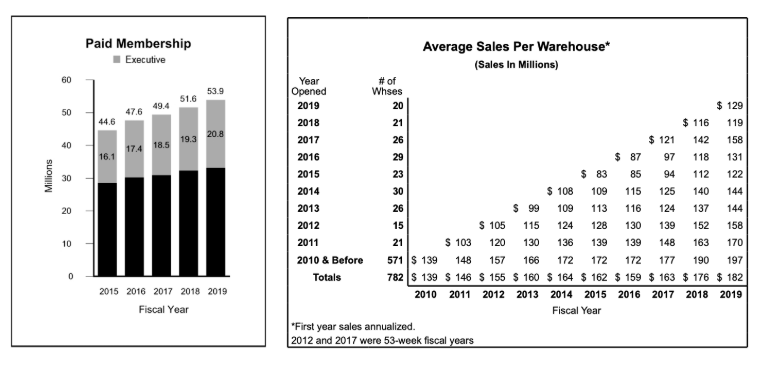
One of the greatest testaments to Costco’s success and profitability is that the company spends next to nothing on their advertising – severe savings in their marketing budget allows Costco to profit from giant margins.
For instance, if Costco spent the same amount on advertising as Target does, about 2.2% of revenue, the company’s operating profit would be slashed by 75%.
In terms of print advertising, Costco only sends out direct mailers and coupons. Digital advertising for Costco vendors, however, is a bit different. Although vendors have minimal control over ad creative and little control over ad copy, Costco digital ads can massively impact your business.
Why? Well, Costco shoppers are heavily influenced by Costco’s recommendations, and even a Costco-branded banner ad can boost your sales.
Another positive benefit of Costco digital advertising is their ordering process. When marketing with Costco, you do not need to pay upfront for a banner ad or email shoutout. Instead, Costco provides chargebacks for the cost of the ad, meaning they will deduct your advertising costs from your profits.
De Nino explains:
“If I wanted to order a massive hero ad for $100,000 per week on the home page of Costco.com, they’d probably give it to me. It may take me two months of sales to make back that money with an actual profit, but there’s no actual exchange of cash. And you never had that money in your bank account, so you don’t miss it.”
